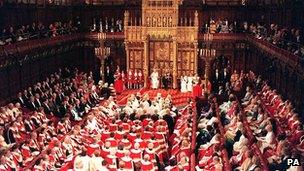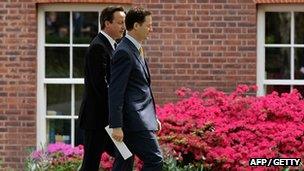Lords reform: Midlands Tories in 'Awkward Squad'
- Published
- comments

What next for the coalition following the Lords Reform Bill rebellion?
Remember the 'Awkward Squad'?
They were the rebellious Conservative MPs who made John Major's life a misery, especially during his government's tortured efforts to ratify the Maastricht Treaty.
Those of us with long memories will recall that at its heart, the 'squad' had a caucus of Midlands MPs including that perennial rebel Bill Cash MP (Stafford then, Stone now) and Richard Shepherd MP (Aldridge-Brownhills).
Messrs Cash and Shepherd feature yet again in the roll call of Conservative backbenchers who opposed their government in Tuesday night's division on Lords reform.
Plus ca change
In a region with 33 Conservative MPs, 15 (yes, almost half!) voted the same way:
Dan Byles, North Warwickshire;
Bill Cash, Stone;
Geoffrey Clifton-Brown, Cotswolds;
Andrew Griffiths, Burton;
Chris Kelly, Dudley South;
Karen Lumley, Redditch;
James Morris, Halesowen and Rowley Regis;
Jesse Norman, Hereford and South Herefordshire;
Mark Pawsey, Rugby;
Chris Pincher, Tamworth;
Laurence Robertson, Tewkesbury;
Richard Shepherd, Aldridge-Brownhills;
Robin Walker, Worcester;
Nadhim Zahawi, Stratford-on-Avon.
Is there something in the air here in the Midlands which nurtures mutiny and sedition?
The truth is there is a huge difference between the new contingent, and the serial malcontents of 20 years ago.
The big potential danger for David Cameron is that prominent on this list are MPs from the 2010 intake.
It includes people like Andrew Griffiths, James Morris, Robin Walker and Nadhim Zahawi, who have generally been among the government's most consistent supporters in the division lobbies over the past two years.
They also reflect a wide cross-section of the parliamentary party which cannot be dismissed as some kind of recalcitrant rump.
Some of them are among the names which have been touted as potential ministers in the expected reshuffle after the Olympic Games.
Together they represent an anti-coalition coalition: they oppose the government's plans, but for different reasons.
Some, like Karen Lumley, opposed the government not because she is against Lords reform, but because she feels now is not the time to be piling a constitutional crisis on top of an economic crisis.
But others, like the undisputed star of this show of backbencher-power, the normally urbane Jesse Norman, branded the bill "a monstrosity".
It was he who circulated the email which enabled the rebels to convince themselves they were doing the Prime Minister a good turn!
'Finger pointing'
"Dear friends," he wrote just hours before the vote, "we have the chance to help the PM by voting against this bill... One single decisive action now will kill this bill outright.
"It will be a vital blow for the authority and strength of the backbenches. Then we have the recess, and a chance to reset the compass and allow our government to govern our country again."

Jesse Norman MP branded the Lords Reform Bill "a monstrosity"
Judging by the widely-reported 'finger-pointing' exchanges between Messrs Cameron and Norman in the aftermath of the vote, the PM did not appreciate the 'help' offered by his long-time friend.
What then are the chances that they will succeed in putting a marker down with their junior coalition partners that they have done quite enough compromising to keep the Liberal Democrats happy, thank you very much?
(Nick Clegg is rumoured to have told David Cameron that Lords reform was the one and only thing he really wanted to see in the Queen's Speech).
No wonder Liberal Democrats see things rather differently.
They say that if the Conservatives renege on their side of the deal on Lords reform, they in turn will be at liberty to oppose cherished Conservative measures, such as proposed boundary changes believed to be worth an extra 20 Tory seats at the next election.
Coalition collapse?
The deeper question of course, is whether all this bad blood between the coalition partners reduces the chances that it can survive until the planned general election in 2015.
Can they really stick it for another three years?
Some commentators suggest that if the coalition really does fall apart, the Liberal Democrats may still agree to "Supply and Maintenance".

David Cameron and Nick Clegg together - but are cracks emerging in the coalition?
This would enable the Conservatives to have their budgets passed by Parliament and to govern as a minority administration.
But wasn't the whole idea of the Coalition Agreement to set up a strong government with a secure majority to bear down on the economic crisis facing the nation?
How could any minority government consider itself strong?
These are among the questions we shall be asking one of the Tory rebels and a Labour peer on this weekend's Sunday Politics programme with the following guests:
Andrew Griffiths, the Conservative MP for Burton;
Peter, now Lord, Snape of Wednesbury.
And I hope you will join us too, in our normal 12 o'clock slot on BBC One on Sunday, 15 July 2012.